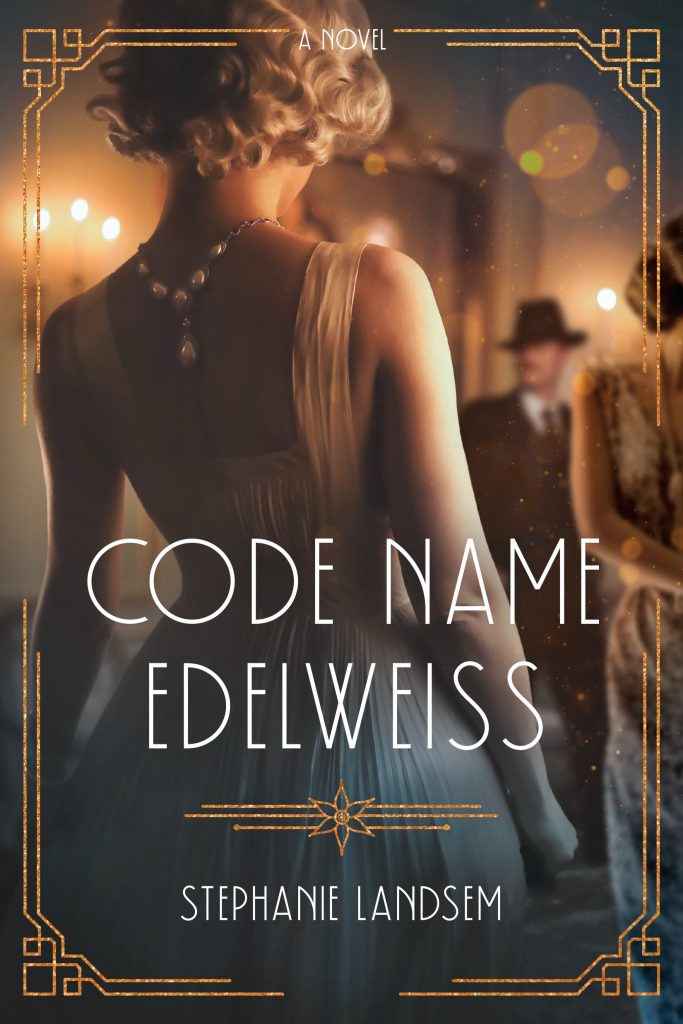“When I stumbled upon the story of Leon Lewis and his spy network, I was skeptical. Why hadn’t I heard about this before? How could something like this happen in America?”
By Stephanie Landsem, author of the book Code Name Edelweiss
Hitlerites infiltrating Hollywood.
Nazis taking over German-American groups in Los Angeles.
Anti-Semitic plots against actors and film executives. Threats of assassinations, bombs, and assaults on Jewish neighborhoods. Amateur spies reporting to a secret spymaster.
Sounds too far-fetched to be true. That’s what I thought.
When I stumbled upon the story of Leon Lewis and his spy network, I was skeptical. Why hadn’t I heard about this before? How could something like this happen in America?
When I followed the research trail and found it was all too true, I knew I had to write a book based on this incredible and little-known event in American history.
Read on to learn more about Leon Lewis and see where fact meets fiction in Code Name Edelweiss.
Who was Leon Lewis and why did he become a spymaster?
The Nazis called Leon Lewis “the most dangerous Jew in Los Angeles.” The police and the FBI called him a scaremonger. In reality, he was a strategist, a whistleblower, and an untiring defender of the oppressed.
So why doesn’t every American know his name?
Because he was so good at what he did.
Born to German-Jewish immigrants in Milwaukee, Wisconsin, in 1888, Leon Lewis was an excellent student and received his law degree from the University of Chicago in 1913. Immediately, he began working on the cause he would dedicate his life toward: anti-discrimination.
During World War I, Lewis served in Army intelligence in Germany, France, and England. He stayed on in Europe in the Army’s War Relief—managing the aftereffects of the war and the Spanish flu epidemic. It was during this posting that he began to see the growing anti-Semitism in Germany. When he returned to Chicago, he continued to keep watch on a young Austrian agitator named Adolf Hitler.
Lewis’s concern increased in 1933, when Adolf Hitler was appointed chancellor of Germany—closely followed by a spike in Nazi influence in the German-American communities of Los Angeles. That was when Lewis began his work as a spymaster, recruiting Christian men and women to gather evidence against Nazi organizations infiltrating the City of Angels.

Leon Lewis’s spy operation spanned more than a decade, much of that time spent filing motions, amassing evidence, attending hearings and other legal activities—deeds that were effective in prosecuting multiple Nazi agents, but not exactly the stuff of great fiction. I chose to write about the beginning of Leon Lewis’s crusade, when he had few operatives and was desperately attempting to get authorities—both local and national—to recognize the threat of Adolf Hitler and his Nazi party.
Despite Leon Lewis’s efforts, it wasn’t until after Pearl Harbor that the government acted decisively against the Nazi agents in Los Angeles. J. Edgar Hoover’s men in the newly created FBI rounded up Nazi spies with surprising speed—using Leon Lewis’s records and years of compiled information to find and convict them. Leon Lewis, in his typical humble fashion, allowed the FBI to take all the credit. Hardly any mention of him made the newspapers or history books.
We know precious little of Leon Lewis’s personal life. He had a wife and two daughters and was said to be a quiet, unassuming, and humble man. Much like his life, Leon Lewis’s obituary, which appeared in the Los Angeles Times on May 22, 1954, was understated and all too short.
Leon Lewis accomplished his goal: he stopped the Nazis’ plans to take over Los Angeles and Hollywood. I have no doubt he saved the lives of many innocent people and perhaps even kept World War II from the mainland of the USA. He deserves far more than a footnote in our history books. He deserves our deepest gratitude.
Featured image photo credit: Brady Bellini (brady_bellini)
You might be interested in:
Code Name Edelweiss by Stephanie Landsem
“What I am looking for—what I desperately need, Mrs. Weiss—is a spy.”
Adolf Hitler is still a distant rumble on the horizon, but a Jewish spymaster and his courageous spies uncover a storm of Nazi terror in their own backyard.
In the summer of 1933, a man named Adolf Hitler is the new and powerful anti-Semitic chancellor of Germany. But in Los Angeles, no-nonsense secretary Liesl Weiss has concerns much closer to home. The Great Depression is tightening its grip and Liesl is the sole supporter of two children, an opinionated mother, and a troubled brother.
Leon Lewis is a Jewish lawyer who has watched Adolf Hitler’s rise to power—
and the increase in anti-Semitism in America—with growing alarm. He believes Nazi agents are working to seize control of Hollywood, the greatest propaganda machine the world has ever known. The trouble is, authorities scoff at his dire warnings.
When Liesl loses her job at MGM, her only choice is to work with Leon Lewis and the mysterious Agent Thirteen to spy on her friends and neighbors in her German American community. What Leon Lewis and his spies find is more chilling—and more dangerous—than any of them suspected.
Code Name Edelweiss is based on a true story, unknown until recent years: How a lone Jewish lawyer and a handful of amateur spies discovered and foiled Adolf Hitler’s plan to take over Hollywood.
About the Author
Stephanie Landsem writes historical fiction for women, about women. She’s traveled the world in real life and traveled through time in her research and imagination. As she’s learned about women of the past, she’s come to realize that these long-ago women were very much like us. They loved, dreamed, and made mistakes. They struggled, failed, and triumphed. She writes to honor their lives and to bring today’s women hope and encouragement.
Stephanie makes her home in Minnesota with her husband, two cats and a dog, and frequent visits from her four adult children. Along with reading, writing, and research, she dreams about her next travel adventure—whether it be in person or on the page.





